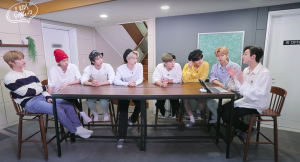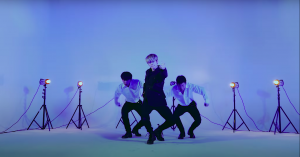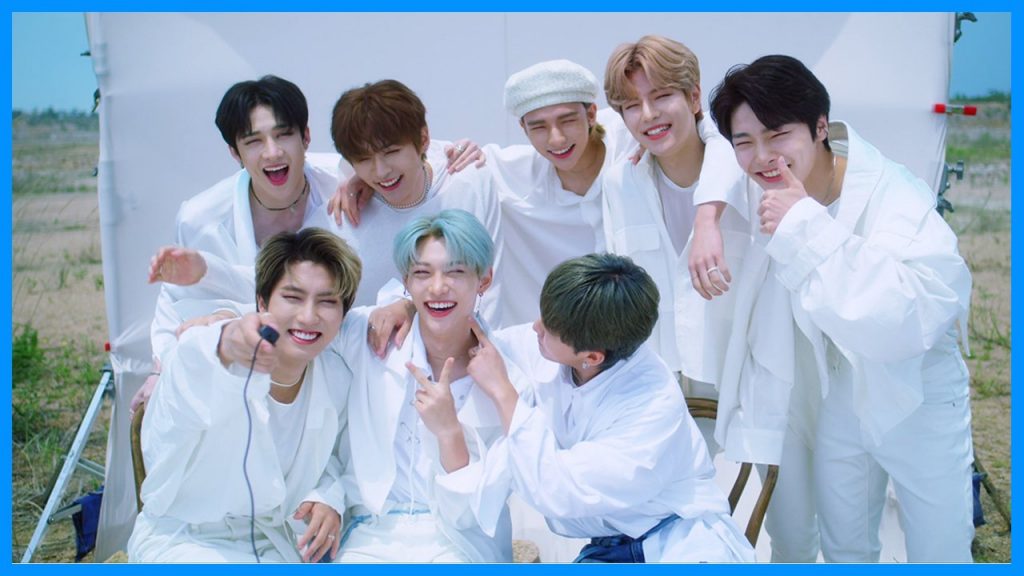
In 2018, Stray Kids walked away from the Soribada Best K-Music Awards (Soba Awards) with the New Hallyu Rookie Award. The following year, the Rising Hot New Star Award. A few days ago, at the 2020 awards, the group received the New K-Wave Global Hot Trend Award, alongside Iz One.
Stray Kids have always stood out for their darker EDM sound, their self-production and rapping skills—particularly 3racha—as well as their painfully relatable lyrics centered around growing up and finding your identity.
Their recent series “2 Kids Song” provides a look into how the members produce a song. Through this four-episode show, Stray Kids further proves just how well-rounded their team is—this time with an emphasis on lyric and melody writing. 3racha, the main writers and producers, may be at the forefront of Stray Kids’ music as a whole, but “2 Kids Song” showcases the other members’ developing skills as artists.
“2 Kids Song” is a spin-off of “2 Kids Room,” where fans got to see the individual relationships within the team. With their newest video series, we witness how Stray Kids work together in a professional work environment as the musicians that they are.
Their task? Make a song from the playful track—á la “Gone Days”—Bang Chan produced. Unlike “2 Kids Room,” the partners for this show were chosen randomly after the members of 3racha split up into different rooms. The songs that were created in the end were shared following the last episode.
Unsurprisingly, some of the members expressed doubt over their abilities and this daunting exercise from the get-go: Seungmin mentioned that he has not “made many songs before” and Felix, especially, kept repeating “I’m so bad” to a patiently listening Bang Chan. In the end, they had very little to worry about.

The Australian members found themselves working together and came out with a song they titled “One More Photo.” Although Felix was partnered with the producer of the track, Bang Chan took a step back and made sure the younger member could spotlight his creativity.
Han and Lee Know drew inspiration from their shared love of iced americanos, filling their room with lightheartedness and laughter. I.N. was paired with Changbin, and the two showed their dynamic as the maknae and the fake maknae. Their final product, “YeahMinBoss,” skirts between cute and serious, priding itself on clever wordplay.
The last team, and the only one that did not have a 3racha member, consisted of vocalist Seungmin and dancer Hyunjin. The worry Seungmin expressed early on in the show evaporated as the two found their rhythm playing around with possible melodies. Hyunjin and Seungmin highlight a moment in their everyday relationship that demonstrates their opposite personalities in a good-natured way.
This series is all about emphasizing the process, and the groups had different approaches, since they all think differently as their own artists. Their individuality and versatility is seen even more clearly through the solo projects, under SKZ-Player and SKZ-Record, that the members released over the past year.
In episode two, I.N. pitched his idea to use “bean sprouts” as a metaphor for earphones. As his partner, Changbin, asked questions to dig deeper into this original inspiration, I.N. mentioned that he wears them so that he can listen to his music and block out his surroundings, especially when he is in a bad mood.
From there, Changbin and I.N. focused on that emotion—crankiness. Thus, their writing started with the situation of an annoyed, yet lonely, person listening to music and not wanting to engage with the world. The sad words contrast with the bright instrumentals that accompany them.
Like I.N. in “2 Kids Song,” Changbin created an emotional track for his SKZ-Player release that focuses on an inanimate object to express loneliness. He employs a streetlight as a metaphor for someone who hides deep pain but still tries to smile in the face of darkness, as part of the refrain goes:
At the end of a lonely day
Standing vacantly
In the middle of the lonely night
I try my best to smile brightly
The black and white MV of “Streetlight” reflects the void of loneliness: it opens with Changbin walking through a door and into the darkness. The door closes behind him, and it shuts out the only source of light. Deep shadows dominate the MV and the barest of highlights struggle to appear.

Color, however, starts to creep back into the frame when Changbin is on the stage and rapping; although the scene is desaturated, he is sharing his words with someone. The rapper reaches out a hand to those watching as the MV closes with the words, “it hurts to be alone”—he understands because he knows that loneliness, too.
On the other hand, Lee Know is known for his quirky personality and unconventional way of thinking, which are on full display in “2 Kids Song.” Lee Know suggests that he and Han diss “Gone Days,” which mentions lattes in its lyrics, using iced americanos (their drink of choice and the song’s theme). Lee Know’s wit shines through in his suggestion to turn “milk” (우유 in Korean) on its side to become “ouch” (아야).
This unique outlook is also evident in Lee Know’s original choreography for the first SKZ-Player release, “Dawn.” His dance style slides between sleek and aggressive, as the sultry jazz-like production of the beginning transitions to an overpowering snare drumbeat, reminiscent of a military wake-up call. Lee Know emphasizes sharp angles and movements that mirror his raw and fierce facial expression once the drumbeats start.

The fast cuts of the camera and the almost blinding flashes of light mimic the rising sun but in an aggressive way that follows how the dancer moves his body and responds to the elements in the song. Lee Know titles his piece “Dawn,” but it is not a dawn of calm; instead, he focuses on a determined energy that challenges the day to bring whatever it has in store.
Han also finds inspiration in unexpected ways: he highlights the little things in “Close.” Its origin? The opening scene from the 2004 movie, Closer. Han paints a movie of his own with his lyrics as he takes the perspective of someone meeting a stranger yet feeling a startling connection with them.
Through Han’s words, the excitement is palatable, a moment brimming with possibility. There is a conversation between the speaker and the stranger they meet as well as the speaker and their internal thoughts. Throughout the song, which ends on the line “I want to get to know you more,” listeners can practically feel the speaker trembling with nerves and excitement.
Hyunjin and Seungmin are the only team that did not have a 3racha member. Despite their concerns in the first episode, they are very much capable of creating music without 3racha. Hyunjin had his production equipment ready for the shooting, and the two quickly formed a melody that they tag-teamed to adjust.
As they build a melody for their song, viewers of “2 Kids Song” are reminded of Seungmin’s distinctive vocals. His voice is given the focus it deserves in his covers of Gaho’s “Start” from the OST of Itaewon Class and Day6’s legendary “You Were Beautiful.” Seungmin has a voice that is airy and can reach the higher notes, like he does in “You Were Beautiful,” but it also has a grounded fullness to it, which creates an intriguing tone.
His cover of “Start” shows his comfort in his upper range, although the instrumentals are especially loud and tend to drown out his voice. The natural tremor that appears at the end of some notes is also lovely to hear.
Seungmin shows off a broader range with “You Were Beautiful.” While it is difficult to compete with Sungjin’s raspy voice, Seungmin sings with his unique clarity. “You Were Beautiful” is already an ambitious song to tackle for a group, making it more impressive that Seungmin sang it by himself.
With his covers, Seungmin demonstrates his versatility as a strong vocalist for not only Stray Kids’ EDM-heavy music but also for upbeat songs and emotional ballads. He has a unique voice that Stray Kids’ group releases do not always allow to shine, since the rappers tend to dominate.
“2 Kids Song” gives viewers a more isolated view of Seungmin’s voice and his skills, particularly when he and Hyunjin develop their melody. With their lyrical and bouncy topline, the two decided to recreate a frequent conversation they have. The two are polar opposites, most notably in their sleeping habits (they share a bunk in Stray Kids’ dorm). Their song, in call-and-response form, starts with Hyunjin’s alarm going off, and Seungmin wondering why his roommate is late—again.
Their differences are expressed, too, through their respective solo projects. While Seungmin went with the familiar for his covers, Hyunjin explored a vulnerable part of himself through his original choreography for Billie Eilish’s song, “when the party’s over.” In his contemporary choreography, Hyunjin captures the essence of hollowness.
Clothed in white, he dances in a minimal space, save the curtains that cover the tall windows. The use of light and shadow accompanies the story Hyunjin tells with his body, such as when darkness dominates once the bass suddenly drops. In this absence of light, Hyunjin becomes a beacon in his white clothing.
There are moments when Hyunjin possesses extraordinary control over his precise movements. Yet, there are also times when he is on his knees, at his most vulnerable, as if he could easily lose his balance as he rocks back and forth from the force of successive sharp movements. Hyunjin always appears to be fighting against something that tugs him in various directions.
At the end, he fades into the darkness, and the only light remaining is the corner spotlight, almost an impersonation of the sun. Once the darkness swallows the light, viewers are left with the title Hyunjin gave his dance piece—“empty.”
Like I.N. and Changbin, the fourth team, found the theme of their song first. Felix pitched the idea of photosynthesis, drawing a connection between Stray Kids, the “seeds,” and the support of their fans as the sun the group needs to grow. He brings attention to the “photo” in photosynthesis: by looking back on photos—which stand for memories they have with their fans—Stray Kids can have even more energy to grow as artists.
In “2 Kids Song,” Bang Chan is the leader that most fans know, encouraging Felix when he is first unconfident in his abilities, listening to his ideas, and building off of them. This part of Bang Chan, however, is nowhere to be seen in his original song, “인정하기 싫어” (roughly translating to “Don’t Want to Admit”), which illustrates an emotionally vulnerable side to this good-humored musician.
Bang Chan’s SKZ-Record song highlights his voice and melody rap over minimal instrumentals, which is starkly different from the tracks he usually produces. The majority of the song is a singular piano note and some light chords, the emptiness saying more. Strings usher in the peak of the song and an explosion of emotion. “Don’t Want to Admit” demonstrates the softness of Bang Chan’s voice and the raw desperation laced within it when telling this story.
When “Don’t Want to Admit” ends, listeners wait for a more satisfactory resolution, which would come if one more chord is played without dissonance. They are denied closure, just like the speaker in the song has to live with the hurt of being betrayed. They hope it is not over, but even they have little reason to believe that, as the last words are “I might as well forget.”

Stray Kids, however, is a group that truly is unforgettable. They maintain a clear sound and identity; yet, they are not shy to emphasize that the members are all their individual artists as well. “Artist,” in addition, does not mean one thing, which Stray Kids demonstrate through “2 Kids Song” and their solo projects.
We are witnessing the tip of the iceberg of what Stray Kids is capable of artistically, from music production, as hinted in “2 Kids Song,” to contemporary dance pieces and songs inspired by the opening scenes of movies. The pre-chorus of “God’s Menu,” Stray Kids’ most recent release, rings even more true with this in mind:
We just keep on making new things
Because we’re one of a kind
No one can copy us, our own game
From the start, it’s all ours.
(YouTube. Naver[1][2]. LyricsKpop. Images via JYP Entertainment.)


